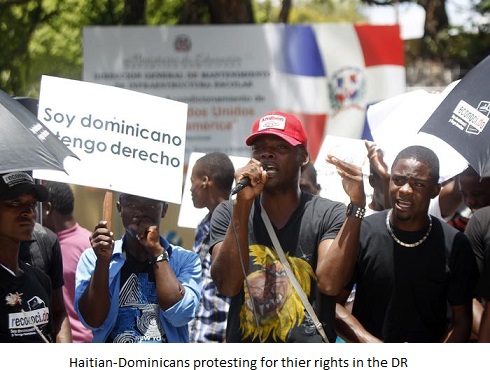CSMS Magazine
In 1956, Jacques Stéphen Alexis, in his famous novel titled Compère Général Soleil, described the despicable horror that took place in the Dominican Republic back in 1938 when more than 40,000 Haitians were massacred by the sadistic regime of Rafael Leonidas Trujillo. Few years down, that same horrific tale was replicated in The Farming of Bones, a gut wrenching novel written by famous Haitian-American novelist, Edwige Danticat. In both instances, the compelling, novelistic prose could hardly be illustrated as fiction, for the tale is stemmed from an ugly episode in the DR history.
The killing fields gut-wrenchingly recounted in the novels were irrefutably true, as historians on both sides of the island had confirmed. So was the attempt to build a clumsy nationalism out of the expense of vulnerable Haitians who had fallen into oblivion when Haiti ceased to be what it once was for over a century: a geostrategic power not just in the Caribbean, but also in the Americas as a whole. Nineteen years of US military occupation from 1915 to 1934 virtually crippled Haiti and, according to many historians, the US occupation had succeeded in neutralizing and ultimately paralyzing the industrial development of Haiti. In doing so, the United States had induced or engineered the impairment of a nation that sought to become the pride oasis for Pan-Africanism.
Henceforth, Haiti had gone down the drain, and the country’s vulnerability was utterly exposed in the aftermath of the 1938 genocide. Then, the world looked the other way as the puppet regime of President Sténio Vincent was resorted to some embarrassing, blundering remarks in an attempt to wash away the humiliation. Today, we’re witnessing a choking replay of that episode. Now, it is the introduction of a modern-day Jim Crow law in the DR—lynching defenseless Haitians in some of the most horrific fashions, setting the stage for a replica of the 1938 mass slaughter.
Building a dangerous nationalism
 The Dominican Republic never had a history of resistance, and in several instances in history, the eastern portion of Hispaniola which is now the DR, was governed by Haitians. The Dominicans, in fact, gained independence from Haiti in 1943 after 25 years of Haitian occupation. Haiti went on to sign several landmarks bilateral agreements with the DR, guaranteeing its sovereignty against any possible European invasion, presumably France and Spain. Like the de facto elite—predominantly mulattoes—of Haiti’s pre-independence era, the Dominican upper class, at first, had no grand ambitions other than to be left alone as they grew rich at the expense of the vast majority of the Dominican poor.
The Dominican Republic never had a history of resistance, and in several instances in history, the eastern portion of Hispaniola which is now the DR, was governed by Haitians. The Dominicans, in fact, gained independence from Haiti in 1943 after 25 years of Haitian occupation. Haiti went on to sign several landmarks bilateral agreements with the DR, guaranteeing its sovereignty against any possible European invasion, presumably France and Spain. Like the de facto elite—predominantly mulattoes—of Haiti’s pre-independence era, the Dominican upper class, at first, had no grand ambitions other than to be left alone as they grew rich at the expense of the vast majority of the Dominican poor.
When they sensed their power had reached its highest ill-conceived plateau, they went on a mission to exercise that power. Heretofore, building a strong sense of patriotism on a deep-seated hatred for African-looking Haitians had become an acute, pressing and exigent necessity. Consequently, Dominican nationalism was built out of a staunch anti-Haitianism; and every time the Dominican elite feel threatened, they push forward the Haitian phobia to shamelessly deviate public opinion from the real economic problems plaguing the country. Because Haiti is the plague everyone loves to hate, many weak-minded individuals in the Dominican society took the bathe.
The latest cry against this Haitiano-phobia came few weeks ago after the public lynching of a young man named Henry “Tulile”Claude Jean, a shoe-shiner of 22 years of age. His violent death has caused outrage across the world. Many citizens in the DR have also rejected the shameful act. The Dominican authorities were quick to lay the blame on some obscure Haitians. Few people believed it. It is hard to imagine an inoffensive shoeshine young man, the father of 2 children, the breadwinner and only source of income for a family of 4, including his unemployed wife, could be a threat to the powerful Dominican upper class. His wife Erzuline Celuma told the story of the humble husband he knew and flatly rejected the notion of revenge killing that the Dominican Chief of Police has been saying in the press.
The Dominican society has some serious problems of its own. According to the United Nations, Dominican women are prime victims in the world of human trafficking and prostitution—a serious problem that most Haitians in Haiti would tell you. For many years, the lower Port-au-Prince night clubs were swamped with Dominican prostitutes. Kidnappings and other forms of social violence are at a level not seen since the grizzly days of the Trujillo regime. And when the grass roots organizations rise to denounce injustices in their country, the xenophobic machine was put in display against poor and defenseless Haitians.
The Dominican authorities must take full responsibility for their actions. Using lynch-mob to achieve their duty work in the hope to assuage the real problems facing their country will not work. Furthermore, denying more the 200, 000 Dominicans of Haitians descents can only embolden such hideous, racist acts—as it were recently the case when the Dominican Supreme Court summarily revoked the rights of those Dominicans retroactive to 1929.
With all said and done, to avoid these humiliating incidences in the future, Haiti MUST be in a position to provide for all of its citizens. Patriotic Haitians have a lot of work to do, but the most urgent work is the struggle to free the land of Dessalines from the grip of its enemies. Only a prosperous, free and powerful Haiti could ultimately prevent the killings and the humiliations of Haitian everywhere.
Note: Dr. Ardain Isma is Chief-Editor of CSMS Magazine. He is a novelist. His latest work of fiction, titled Midnight at Noon, is a critically acclaimed and powerful novel that describes horrific tales of raw exploitation in Haiti and what can be done to rescue Haiti from the brink. To order a copy, click here: Midnight at Noon. Also, like us on Facebook: www.facebook.com/csmsmagazine



I can feel your pain, KetTou. The story of our country is one that we NOT should be ashamed of. On the contrary, we need to double or redouble our courage and effort in the struggle for social justice, for Haiti to reclaim its past glory and for all of its children could find a room to live in peace and harmony among one another. It may sound like a distance dream, now. But it is undoubtedly doable. Haiti was never born to perish. We like your comment.
My condolences to Mr. Jean’s family. In order for Haiti to become a country where its people would feel no need to escape to the neighbors’ for bread, Haitians need to, for a change, create an environment where Haitian-lead entrepreneurship is supported and RESPECTED. When Haitians want to “dechouke”, they don’t go for the foreign businesses, but for those of the Haitians in the community.
Indeed. The sad thing is the hypocrisy of those who have claimed to love Haiti and Haitians everywhere. They sit there and do nothing while an entire population sinks into oblivion. I commend you Dr. Isma for this yet another well-written and quite informative article. Bravo to you, to Claire, to Christine, to Gyna, to Jacob and to all the rest of the team CSMS Magazine.
Sad, really sad. The stories are awful.